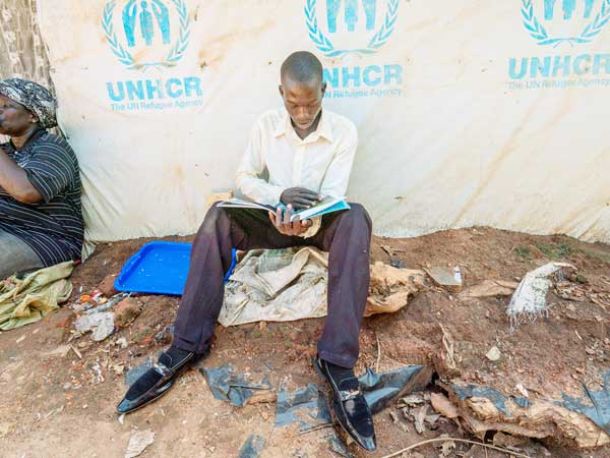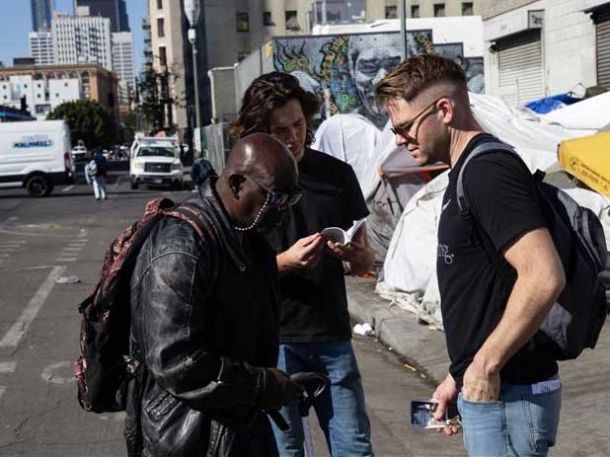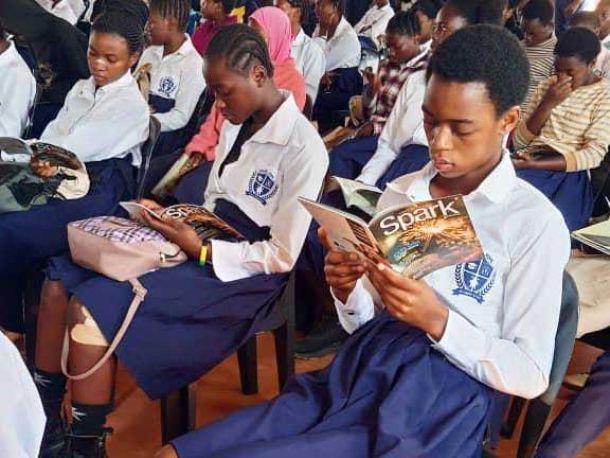More Than a Nightstand Drawer
When I hear people describe who ShareWord Global is, it typically starts by talking about Bibles in hotel rooms. It’s our legacy. And the concept of leaving a Bible in a hotel nightstand and never knowing whether anyone read it, if they even noticed it, has been what was done for over 100 years.
But our society and culture shifted.
We’re called to share the gospel, but it’s so incredibly hard to do when the moment someone sees you holding a Bible, they shut down. They put up walls. They walk away.
“We were already down this path of trying to think of ways to create more relevant Scripture resources for evangelism or placement in today's world,” Kelvin Warkentin said, Director of Strategic and Product Development at ShareWord Global.
“The first Scripture magazine came from a real-world experience for our president (at the time) who was sitting in an emergency hospital room while his father-in-law was in a crisis situation. He was sitting in the waiting room of the hospital and he's looking around and thinking to himself, 'where is there hope in this room for somebody who's dealing with this crisis?’”
This was the creation of the Hope magazine. But no one was sure how it would be received. It was something the ministry had never done before. But it took off in a way no one expected, and the warehouse ran out of copies quickly.
Kelvin continued by saying, “the originating thought of it was still placement. We weren't where we are today, where it's all about personal evangelism. Back then, it was about finding good places to place (Scripture magazines). But we very quickly discovered members were going to put them everywhere. We'd hear stories of somebody finding one at a barber shop or at an auto repair place.”
The response to the Scripture magazines around the world has been undeniable. In Cuba, where the Esperanza (Hope) magazine has been primarily used, believers have started Esperanza Churches. Where it has been difficult to worship and fellowship in a church building, these Esperanza
Churches are hosted in homes and focus on evangelism.
In some past letters, you may have read about Spark Groups. Groups of people in the Middle East saw the Sparkmagazine and the hunger kids had for the gospel. So, they turned this magazine into a 12-week curriculum for the children.
A simple magazine was turned into so much more. They created a full book for teachers with activities to do with the children, questions to ask, scripts to roleplay situations, and easy ways to answer any questions the kids might have.
Sometimes in the office, we don’t always see the result of the things we write, or the resources that get developed. So, when we learned about the Spark Groups, I asked Kelvin what he thought.
“It's rewarding. You want things that you create to be used and find value, and that they connect. I want the message that I shape to resonate and connect and be transferred. It's like a dandelion seed that blows in the wind. I always wonder where they end up because their whole purpose is to be planted, to take root, and to grow another dandelion. I never thought of Arabic-speaking kids reading the Spark magazine when I created it. I was thinking of Canadian kids.
But it's that idea of something being planted, or taking roots, somewhere else, and helping shape a kid...I get emotional when I hear stories of kids who have been a part of a Spark Group. A kid's actually reading it. They felt fear and now they don't feel fear. It takes me back to my own childhood, and I can trace back why I didn't feel afraid. I knew God was there. So even if I was lonely or if I was afraid, I knew that God was there with me. I want kids to feel that, too. I want them to not feel alone. I want them to feel like they don't have to be afraid. So, it is very, very rewarding to hear stories.”
This is all happening in places around the world where they have little access to the full Bible. And these Scripture magazines, including our e-magazines and audio Bibles, have made it easier to evangelize and they allow believers and members of our ministry to give the lost something that’s contextualized for their culture.
It's something that needs to be used more than ever here at home in North America. People find it hard to share their faith for fear of offending someone, or not feeling like it’s their place to talk about Jesus. But it’s so far from the truth. Handing out a magazine with portions of Scriptures inside opens the doors for conversations, more so than distributing full Bibles in some cases.
Scripture magazines are just the steppingstone, though. Most of the time in refugee camps in the Middle East, new believers are only given the magazines at the beginning. After going through them, and connecting with a local pastor, they are then given their own full Bible to continue growing their faith.
And just as it was back in 2012, the ministry has now come to a point where more innovation is needed. The world is going digital, and ensuring these Scripture magazines are available in a digital format allows for even more ministry work to be done around the world, bringing the gospel to more regions and to those who have vision impairments or can’t read. And sharing a QR code for a download is much more convenient when physical magazines aren’t on hand. For some believers, it can be an easier way to share the gospel.
This is where you can come in. As believers in North America, we don’t always feel comfortable sharing our faith. It’s awkward to start the conversation. It’s disheartening when people are closed off and shut you down. Honestly, when believers approach me on the street to evangelize, I don’t always feel comfortable either, and I’m a Christian.
But it is up to us to bring the Good News to people around us. This can be your chance to bring the gospel to your neighbourhood. You can help set up Esperanza Churches here in the form of a small group. Talk to your church about getting involved, partnering with us if they haven’t already, and creating a real change in North America.
We say it all the time that together, we can tell the world; and the world starts in our own backyards.


